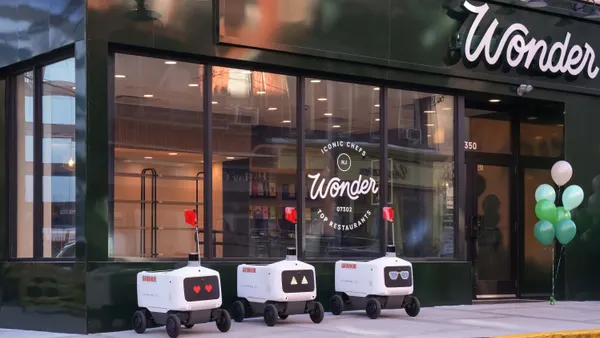Dive Brief:
- Uber Eats has added allergy friendly filters to its app, allowing users to search for restaurants that are allergy friendly and to communicate allergy or dietary restrictions, according to a company announcement. If restaurants can't accommodate a request, businesses can message users and provide opportunities to order another item.
- Users also will need to opt in to receive single-use plastics, such as straws and utensils, with their orders in the coming month.
- Uber also integrated Uber Eats into its Uber app, which is being tested in hundreds of U.S. and international cities, according to a separate announcement. Uber Pass, which combines ridesharing, bikes and scooters and Uber Eats in one, is now available in 10 cities and Eats Pass is available in 18 cities.
Dive Insight:
Although Uber took a loss of $5 billion during the last quarter, Uber Eats grew active platform consumers by 140% during the period and gross bookings rose to 6.4 billion.
Even with this upward momentum, CEO Dara Khosrowshahi doesn't expect profitability anytime soon. Its strategy is to retain customers, which the new updates are aimed at.
Today's diner craves personalization, so the move to include filters that can be used for dietary preference and allergies could poach delivery customers from rival apps. It could also help protect restaurants from negative consumer sentiment that can arise when a brand is unclear about allergens and other ingredients present in food.
These additional features will also give Uber Eats a bit of a competitive advantage against its closest competitors DoorDash, Grubhub and Postmates, which have been adding more restaurant partnerships and growing market share within the last 18 months. Postmates has also been bulking up its service offerings with the addition of Postmates Live, which allows users to order and pickup items at select stadiums and events, and its group order feature.
With Uber Eats losing its exclusive partnership with McDonald's, it will need to find other avenues to grow its customer base. Even with this loss it processes the most orders (30%) of any other delivery company. It also has the third largest market share by sales in the U.S., so it has strong footing to retain its customer base.
One way the company has been enhancing the customer experience is through a five-point tracker that allows users to see where their order is in the process. It also enhanced its rewards program, allowing users to redeem points for every rider or food order, according to the press release.
U.S. users will have the option of choosing their rewards, such as a $0 delivery fee, free meal items from partners like McDonald's and Ben and Jerry's or discounts on Uber rides. The rewards program will also be available globally, allowing U.S. travelers to earn points abroad.
Rewards programs are quickly becoming a differentiator in the space. Grubhub rolled out a rewards program during the summer that allows users to collect and redeem rewards programs from partnering restaurants.











